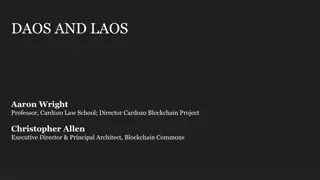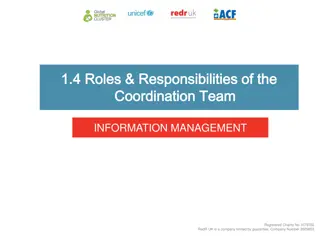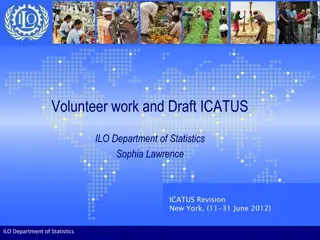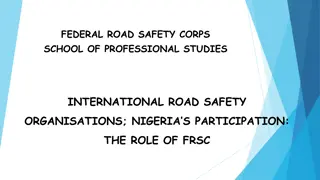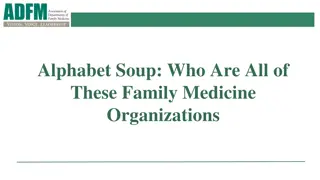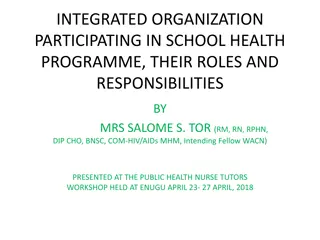WORK ORGANIZATIONS AND THEIR ROLES AND RESPONSIBILITIE
This presentation explores the roles and responsibilities of work organizations in South Africa, focusing on corporate social responsibility, community engagement, and corporate governance principles. It discusses the importance of institutions in higher learning and highlights key aspects such as CSR activities, challenges, and examples of CSR programs in the country.
Download Presentation

Please find below an Image/Link to download the presentation.
The content on the website is provided AS IS for your information and personal use only. It may not be sold, licensed, or shared on other websites without obtaining consent from the author. Download presentation by click this link. If you encounter any issues during the download, it is possible that the publisher has removed the file from their server.
E N D
Presentation Transcript
WORK ORGANIZATIONS AND THEIR ROLES AND RESPONSIBILITIES Prof. L.D Mogorosi Dr. P.S Manganyi & Dr. N.J Budeli D e p a r t m e n t o f S o c i a l Wo r k U n i v e r s i t y o f Ve n d a
AIM OF THE PRESENTATION Presentation is about: Organizational corporate responsibility General community engagement for corporates Community engagement: Roles that work organizations and institutions need to play where they are located, to assist in making contribution to hosting communities. Institutions of higher learning are tasked with 3 key mandates: teaching and learning research community engagement
INTRODUCTION AND BACKGROUND Issues that are included in this presentation: Preamble of SA Constitution Corporate governance principles Corporate citizenship Challenges for CSR Corporate social responsibility (CSR) Four major corporate responsibilities Stages of development of CSR activities Focus of CSR in work organizations Examples of CSR programs National expenditure on CSR
REFLECTING ON WHO WE ARE ( and what we promised each other) The Preamble of the Constitution of the Republic of South Africa (1996)
THE CONSTITUTION: REPUBLIC OF SOUTH AFRICA (1996) Preamble Preamble We, the people of South Africa, Heal the divisions of the past Recognize the injustices of our past; Honor those who suffered for justice and freedom in our land; Respect those who have worked to build and develop our country; and Believe that South Africa belongs to all who live in it, united in our diversity. We therefore, through our freely elected representatives, adopt this Constitution as the supreme law of the Republic so as to - Lay the foundations for a democratic and open society Improve the quality of life of all citizens Build a united and democratic South Africa
CORPORATE GOVERNANCE PRINCIPLES (Aras and Crowther, 2009:15) Good corporate governance require that organizations and institutions be influenced by universal governance principles. These corporate principles revolve around four elements, namely: transparency accountability responsibility fairness All these principles are related to organizational corporate social responsibility.
CORPORATE CITIZENSHIP Corporate citizenship implies that work organizations and institutions have - to some degree and level - rights, duties and responsibilities in societies where they operate. For its fulfilment, corporate citizenship means the need to re-thinking about the roles of such organizations and institutions in society.
CRITICISM AGAINST CSR Arguing against the involvement of business causes, a conservative American economist, Friedman stated: The business of business is business - not anything else! The only corporate social responsibility a company has is to maximize its profits If you pay people not to work and tax them when they do, don t be surprised if you get unemployment dr lobelo d mogorosi 8
MAJOR ORGANIZATIONAL CORPORATE RESPONSIBILITIES Modern work organizations and institutions - be they public or private, for profit or non-profit, small or large - have roles and responsibilities in society which extend beyond their obligations to their members. These members may be stakeholders, investors, voters or supporters. Work organizations have four major corporate responsibilities. These are as presented in the table to follow. dr lobelo d mogorosi 9
FOCUS OF CORPORATE SOCIAL RESPONSIBILITIES (CSR) OF WORK ORGANIZATIONS Corporate Social Responsibility Target of CSR Programs In the South African context, CSR programs are known as: To benefit own employees, their families or the larger hosting community, work organizations: Fund Participate Assist in selected activities Corporate social investment (CSI) Corporate community relations (CCR) or Corporate community affairs (CCA).
ORGANIZATIONAL CORPORATE RESPONSIBILITIES FOUR MAJOR (ORGANIZATIONAL) CORPORATE RESPONSIBILITIES Social Economic Responsibility (CER) Legal Moral Responsibility (CSR) Responsibility (CLR) Responsibility (CMR) dr lobelo d mogorosi 11
POLICY AND PRACTICE AREAS: CORPORATE SOCIAL RESPONSIBILITIES Corporate Social Responsibility Human Resource Policy Purchase Policy Investment Policy Environment al Policy Philanthropy dr lobelo d mogorosi 12
Policy and Practice Areas: Corporate Social Responsibilities SOCIAL RESPONSIBILITY Human Resource Policy Philanthropy Investment Policy Purchasing Policy Environmental Policy 1. Compliance with human rights 1. Assist community programs 1. Compliance with safety & health laws 1. Employment equity 2. Diversity & empowerment 2. Compliance with BEE 2. Provide for the poor and needy 2. Training emerging suppliers 1. Use renewable energy 3. Ownership & share equity 3. Employee housing 2. Save water 3. Develop CE Office & projects (CSI) 3. Help develop local suppliers 4. Scholarships (staff & dependents 3. Recycle plans 4. Monitor partners compliance with CSR 4. Abatement of pollution 4. Involve staff in CE /CSI (giving, sharing) 4. Buy local 5. Employee wellness 5. Buy from SMMEs dr lobelo d mogorosi 13
MATURITY OF CSR ACTIVITIES Stages of Maturity of CSR Programs and Activities Window dressing Cost Stakeholder engagement Sustainability Accountability containment
EXAMPLES OF CSR INITIATIVES AND PROGRAMS CSR initiatives and programs: Health and wellness Education and training Economic empowerment Selected groups (e.g. children, youth, women, people with disabilities) Urban and rural renewal projects (infrastructure and housing) Arts and culture Nature preservation
NATIONAL SPEND AND FOCUS OF CSR /CSI Programs and projects focus: Types of organizations as recipients include: Education support Social and community development Health Disaster relief Environmental causes Companies current (2020) spend in SA: Non-profit organizations State institutions Educational (e.g. universities, schools) Health (e.g. hospitals, clinics) Estimated to be R10.2 billion on corporate social investment programs and projects dr lobelo d mogorosi 16
CONCLUSION: WHERE TO FROM HERE? In 1972, Friedman said that the business of business is business - not to get into solving social problems! Was he correct? Observations: All citizens - including corporate ones - have joint responsibility to put their shoulders to the wheel and assist in getting society in positive direction.
Have fruitful discussions Thank you P rof. L.D Mogorosi (Assoc . P rofessor Soc ia l Work) Dr. P.S Mang anyi (Senior Lecturer : Fieldwork in Social Work) Dr. N.J Budeli (Senior Lecturer & Interim HOD: Social Work) D e p a r t m e n t o f S o c i a l Wo r k U n i ve r s i t y o f Ve n d a
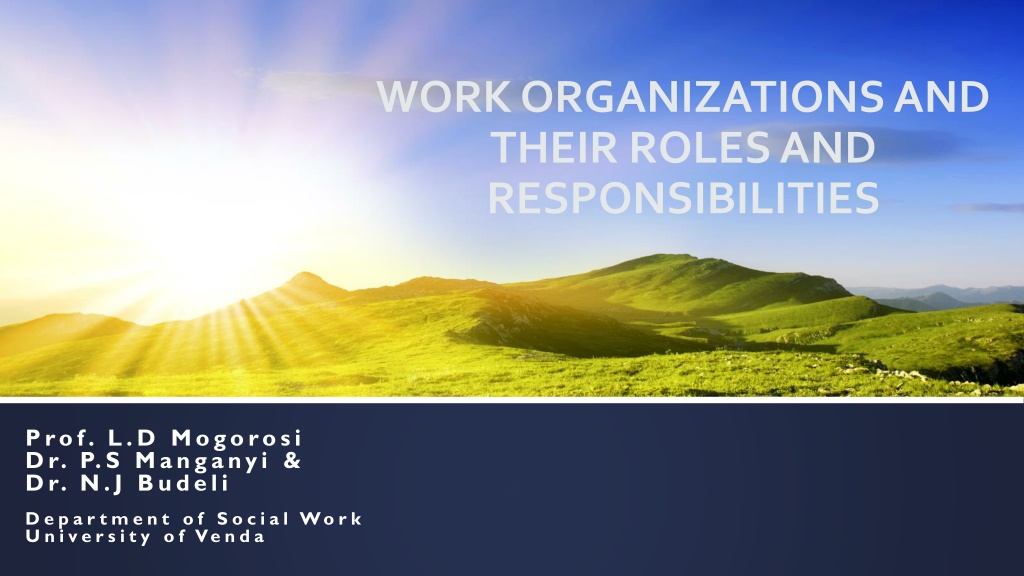
 undefined
undefined














